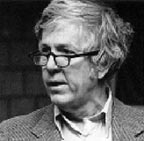|
July 10 , 2000 The
End Is Near Temp
Slave Revolt Locked
Down Editorial Forgotten
America Appall-O-Meter Bully
Culprit Three's
Company Don't
Drink the Water Eight
Is Enough Pass
the Petition Profile Botched
Burbs Harrington's
Way Slaughterhouse
Live Shakespeare
Inc. Post-Feminist
Smackdown! |
By Kim Phillips-Fein
The Other American:
The Untold
Life of Michael Harrington
By Maurice Isserman
Public Affairs
449 pages, $28.50
 |
|
Michael
Harrington
|
When Michael Harrington worked in the Catholic Worker movement as a 23-year-old in the early '50s, young staffers used to joke that they were in pursuit of sainthood. Harrington came close; near the end of his life, he became "a kind of secular Saint Francis of Assisi," in the words of his biographer, Maurice Isserman. But Harrington never grew accustomed to sainthood, even the secular variety.
His position as a lone voice of conscience speaking out against Reaganism reminded him of how irritated his mentor, Norman Thomas, had been in the position of "a socialist who threatened no one and nothing ... who could be revered on ceremonial occasions and cited to prove the country was genuinely tolerant and democratic." Assessing his own life, Harrington worried that he would be remembered only as "a lesser Norman Thomas." It was a prescient, if damning, bit of self-analysis. At the end of his new biography of Harrington, The Other American, Isserman concludes that this characterization was, unfortunately, just about right.
Michael Harrington - author of The Other America and founder of Democratic Socialists of America - makes a perplexing biographical subject. He may have been "the heir to Eugene Debs and Norman Thomas as America's foremost socialist," but only long after the Socialist Party had ceased to have any influence on national affairs. He opposed Communism in the '50s, and in the '60s he did not support the anti-war movement. He never held a position of influence in any large institution. The Other America is a moving book, but Harrington's reputation as "the man who discovered poverty" is wildly overrated, and his actual influence on the War on Poverty legislation was negligible. Even Isserman's opening quote - from the E.M. Forster novel Howard's End - suggests the difficulty of writing about someone like Harrington: "With infinite effort we nerve ourselves for a crisis that never comes."
Yet The Other American is more than a well-written biography or an elegant, balanced study of the hidden recesses of the postwar American left, though it is both these things. It is, in fact, as much a plea for a certain kind of left politics as it is a history book. What Harrington represents to Isserman is the "other" American left: anti-Communist, friendly to liberals, sympathetic to religion, willing to work within the system, nose turned up at the extremism of SDS. Isserman is not romantic about Harrington. The biography is remarkably even-handed, and offers a good account of Harrington's failures as well as his successes. But Harrington's life is of interest to Isserman primarily because it seems to represent a (mostly) usable past for what remains of the left today.
Kim Phillips-Fein, a contributing editor of The Baffler, frequently writes for In These Times.
![]()
|
In These Times ©
2000 |
